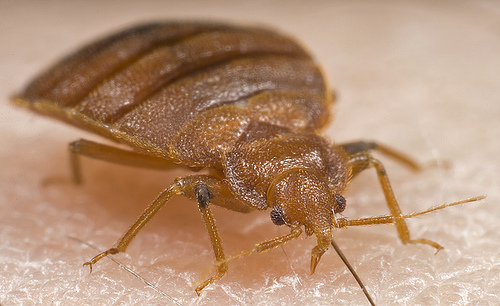“Good night, sleep tight, don’t let the bed bugs bite.” If you live in the City of Chicago this may be a reality since the city was recently named the nation’s number one city infested with bed bugs. Bed bugs are small reddish brown bugs that are about the size and shape of an apple seed. They feast on human and animal blood and just one feeding can sustain a bug for a year. They usually bite at night and live in clothing, furniture, bedding and baggage. While they are not known to carry diseases, their bites can cause swelling, redness, itchiness and lack of sleep.

To combat this growing problem, on June 5, 2013, the City Council passed the Chicago Bed Bug Ordinance to resolve the infestations in apartment and condo buildings. The ordinance labels bed bugs a “public nuisance” and persons violating the ordinance can face fines up to $1,000 a day. The ordinance takes effect on December 2, 2013. The ordinance places responsibilities on both landlords and tenants and some of the provisions are highlighted below.
Responsibilities under the Chicago Bed Bug Ordinance
Landlord Responsibilities
- To provide an informational brochure to tenants starting or renewing a lease.
- Upon notification of a bed bug infestation, landlords must immediately hire a pest management professional to “totally eliminate” the problem, even if this requires multiple treatments.
- To provide written notice to the tenant explaining their responsibilities before any inspection .
- To maintain a written report of any bed bug problems and store receipts for all treatments. These records must be available for inspection by city health officials.
- To inspect and treat all units neighboring the infested unit to ensure the bugs have not spread.
Tenant Responsibilities
- To send written notification to the landlord of any suspected or known infestation in the tenant’s unit, clothing, furniture or personal property.
- To send written notification to the landlord of any unexplained bites, stings or sores suspected to be caused by bed bugs.
- To cooperate with the landlord in the control, treatment and eradication of the bed bugs, including granting access at reasonable times upon reasonable notice for inspections and treatments.
- To properly dispose of any personal property that cannot treated or cleaned by the pest management services.
Condo Associations
- Every association must draft a plan for the detection, inspection and treatment of bed bugs by September 5, 2013 that must be posted on the city health department’s website.
- To immediately report any bed bug incident to the Department of Health.
- To hire a professional pest management service to “totally eliminate” the problem, even if this requires multiple treatments.
- To maintain a written record of all treatments that must be accessible to city health inspectors.
The Chicago Bed Bug Ordinance will be enforced by the Department of Buildings and the Department of Public Health. If any person is found in violation of the ordinance they may be fined $300 to $1,000 per day for each offense.
The ordinance includes more detail than outlined above. Landlords and tenants need to become familiar with the ordinance and take necessary measures to ensure compliance.
